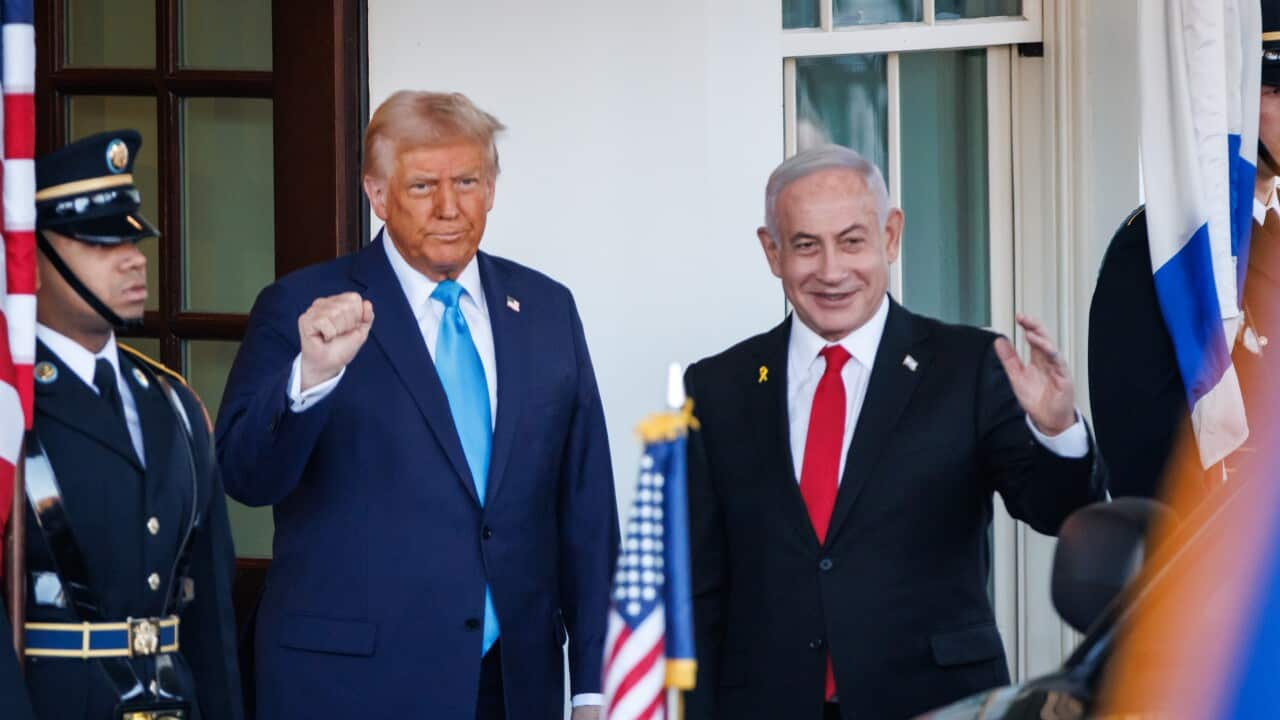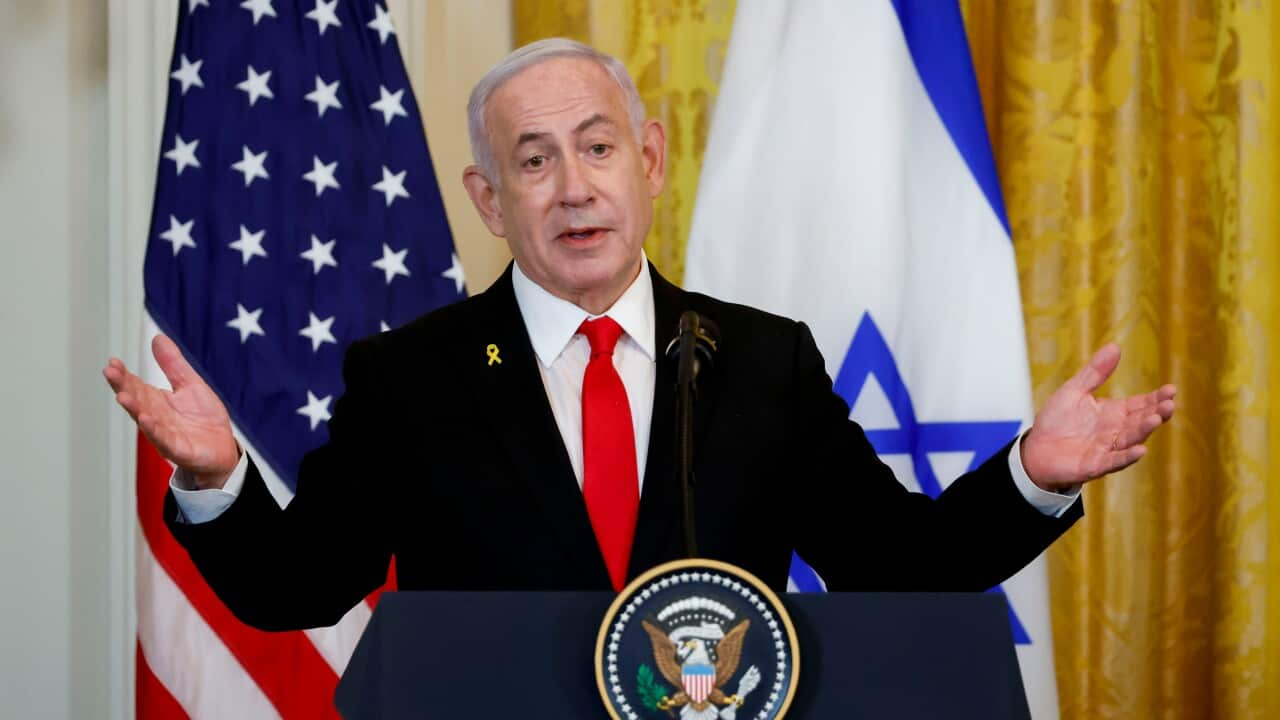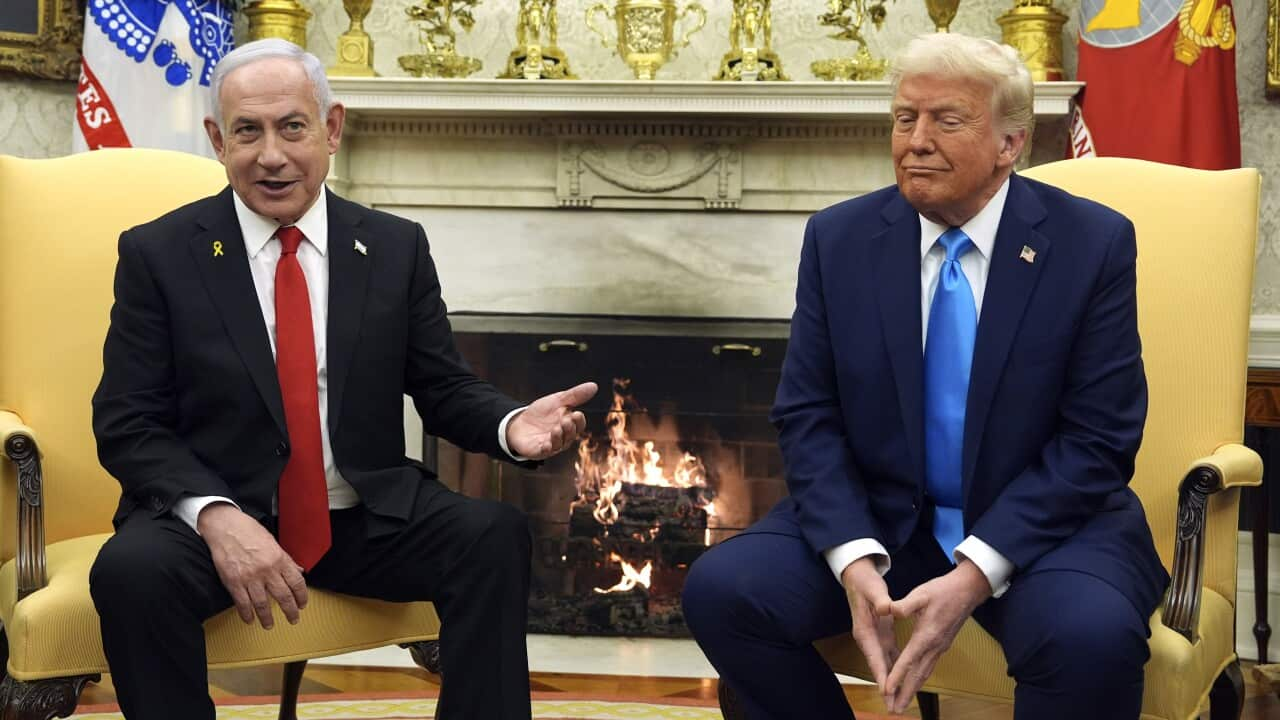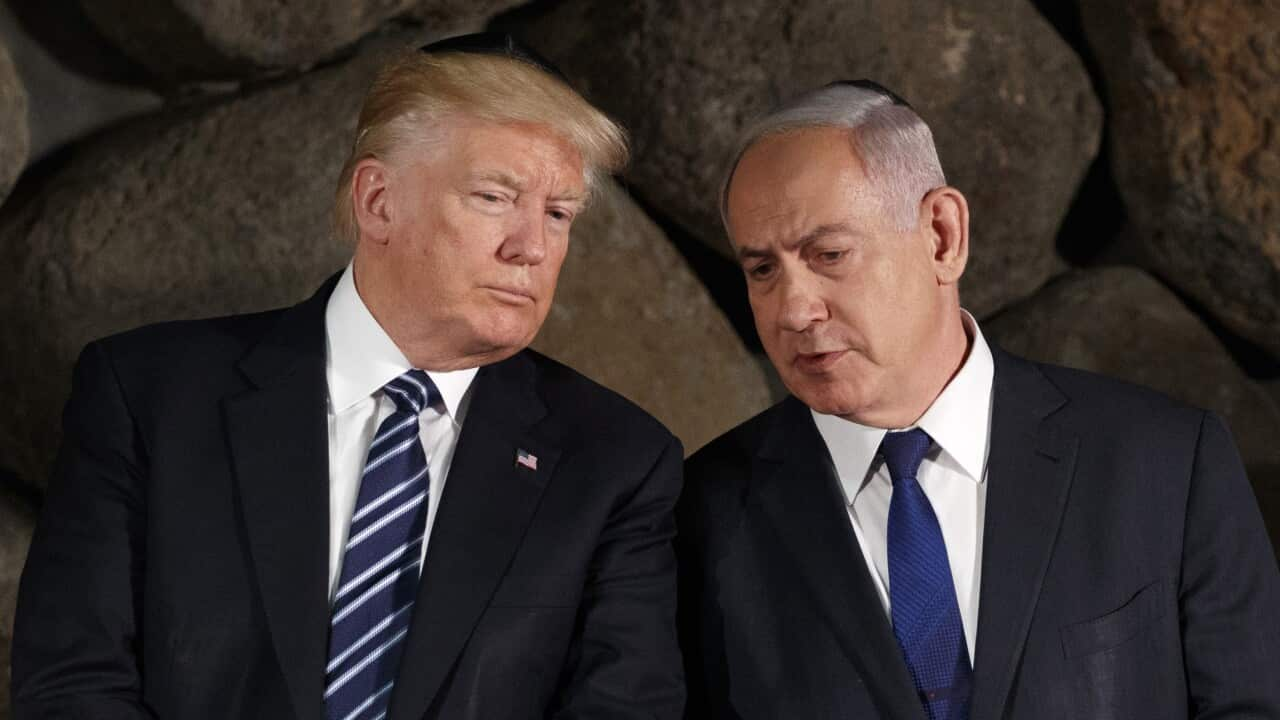A remark at a news conference in Washington has transformed into serious fears of "fundamental violations" of international law.
United States President Donald Trump said on Wednesday he wanted to demolish the remaining structures in Gaza and transform the territory under US "ownership".
"The US will take over the Gaza Strip, and we will do a job with it, too," Trump told reporters.
He proposed transforming the seaside enclave into the "Riviera of the Middle East", proposing to resettle Palestinians from Gaza in Egypt and Jordan.

US President Donald Trump's proposed resettlement of people in Gaza has drawn swift condemnation around the world. Source: AAP / Mohammed Saber/EPA
He added that "no soldiers by the US would be needed".
The move has already drawn swift condemnation around the world, with experts speculating about his motives.
Israel's foreign minister Gideon Saar said on Friday morning that Israel does not yet have details on Trump's plan.
It is possible that Trump may be serious about his plans to redevelop Gaza and forcibly relocate Palestinians, which could be considered a war crime and a crime against humanity under the Rome Statute of the International Criminal Court (ICC). The US does not recognise the ICC.
Others wonder whether Trump's 'take over' proposal is a bargaining chip.
Are Trump's Gaza plans a negotiation strategy?
As , it's speculated that Trump's suggestion of a US takeover of Gaza may be used as leverage to have Hamas accept ceasefire conditions that it wouldn't have considered otherwise.
Israeli observers have suggested Trump could be using a negotiating tactic known in Israel as "putting in a goat" — laying down a demand for the purpose of removing it later and appearing to have granted a concession, according to US broadcaster NPR.
In other words, use a big threat to get a deal done.
It's a tactic Trump has used recently in the. Before the tariffs had come into place, a deal was struck.
Imogen Saunders from the Australian National University, who researches public international law, said it's hard to tell whether it's a thought-out negotiating tactic or a spur-of-the-moment comment but said the announcement of the plan was a surprise.
"It's fair that no one saw this coming. This wasn't something that was expected to be announced. So it certainly wasn't anything that made sense in the context of prior US foreign policy over Israel and Gaza," she told SBS News.
"Even if this announcement is actually a legitimate foreign policy that he really intends to pursue, that's not to say it would actually happen or that he might not change his mind in the next weeks or months."
But David Smith from the University of Sydney's US Studies Centre says it's hard to see what bargaining power it would have.
"Because Trump's announcements were so vague, impractical and unpopular, it is hard to see what negotiating value it would have," he told SBS News.
"Every relevant actor in the region immediately said no to the idea, and even [Benjamin] Netanyahu, while praising Trump's thinking, avoided suggesting that it would actually happen."
Calling it an "inflammatory" move at a critical moment of the Gaza ceasefire, Smith said the plan may not influence negotiations.
"Hamas is not going to start making major new concessions to Israel out of fear of this possibility because they know it won't happen," Smith said.
"Far from helping negotiations, this was an inflammatory suggestion at a very delicate early stage of the Israel-Hamas ceasefire, when the question of who will control Gaza in the long term is still far from resolved. But Trump's 'proposal' may not derail the process because everyone recognises how absurd it is."
'Fundamental violation' of international law
For some, the belief that a US-occupied Gaza is a negotiation tactic may be easier to swallow.
This is because the alternative would mean a "fundamental violation" of international law, according to Saunders.
"I think the reason that perhaps people are very eager to believe it's a negotiating tactic is because if it were to occur, it would be a fundamental violation of so many of the most important norms of international law," she said.
"It would have incredibly far-reaching consequences that I think most countries in the world do not want to see.
"So it is preferable to believe it is merely rhetoric that is being said to try and gain some advantage than a country seriously suggesting that they are going to fundamentally breach international law in a variety of ways."

Donald Trump's plans to 'take over' Gaza could mean a clear violation of international law, experts say. Source: Getty / Anna Moneymaker
The forced deportation or transfer of a civilian population is a violation of international humanitarian law, a war crime, and a crime against humanity.
"This isn't a small breach of international law. If Trump were to go ahead with a plan that forcibly deported Palestinians from Gaza, that the US took over the territorial acquisition of Gaza for commercial profit, it would breach the fundamental crimes in international law," Saunders said.
"This is not an area of international law being ambiguous. This is not an arguable situation. This is not an action of self-defence. It is a clear violation of some of the most fundamental rules of international law," she said, adding that the logistics of Trump's plan would include forcibly rounding up people and removing them from their homeland.
"We haven't seen anything like that in modern history.
"It would be a fight. It would be a war."
Has Trump gained anything from announcing these plans?
If Trump's Gaza plans were indeed a negotiation tactic, one would expect to see some positives gained. But while a stronger relationship with Israel might be gained, the move has been met with international condemnation.
"The only country that might be possibly supportive of the plan is Israel," Saunders said.
Smith said Trump has "got nothing from this apart from the lavish praise of Benjamin Netanyahu".
"But this could come at a serious cost to his, and his country’s, credibility."
World leaders quickly rejected Trump's proposal, including officials from Germany, Brazil, Saudi Arabia, Jordan and Egypt, as well as many members of the US Congress.
The United Nations, human rights groups and some Democrats said removing Palestinians from Gaza amounted to ethnic cleansing.

Israeli Prime Minister Benjamin Netanyahu said there was nothing wrong with US President Donald Trump's Gaza proposal. Source: AAP / Samuel Corum/Sipa USA
Netanyahu said there was nothing wrong with Trump's proposal.
"The actual idea of allowing Gazans who want to leave to leave. I mean, what's wrong with that? They can leave, they can then come back, they can relocate and come back. But you have to rebuild Gaza," Netanyahu said in an interview on Fox News on Thursday.
Saunders said even if it was an attempt at negotiating, it won't be met with open arms.
"It might be seen as playing hardball [but] I think it has the disadvantage of getting a lot of countries that are really vital to peace in the Middle East just off the negotiating table at all, because it's so extreme that it gives nothing to work with," she said.
Additionally, Trump may be at a loss either way, according to Smith.
"If they don't say yes, then he either needs to back off his claims (showing everyone that he is not as resolute and powerful as he claims to be), ramp up his threats (burning more international goodwill and political capital without getting anything for it) or actually use force, which could get the US bogged down in more unwinnable wars, or at the very least break up the system of alliances which has been at the core of US national security for decades," he said.
"He is putting himself in no-win situations."
Why have White House officials already backtracked?
Already, members of the Trump administration have backtracked on the proposal, including White House press secretary Karoline Leavitt and secretary of state Marco Rubio.
At a White House briefing on Wednesday, Leavitt hailed Trump's Gaza proposal as "historic" and "outside of the box" thinking but stressed that he had not committed to putting "boots on the ground" in the territory. She declined, however, to rule out the use of US troops there.
At the same time, Leavitt walked back Trump's earlier assertion that Gazans needed to be permanently resettled in neighbouring countries, saying instead that they should be "temporarily relocated" for the rebuilding process.
On Friday morning, US Secretary of State Marco Rubio said Gaza currently is "not habitable" due to dangers like unexploded weapons, and said people would have to live elsewhere while the area is rebuilt.

White House press secretary Karoline Leavitt praised Trump's plans in Gaza but stressed he had not committed to putting "boots on the ground". Source: AAP / Graeme Sloan/Sipa USA
"There could be an individual motivation in terms of not wanting to be implicated in committing international crimes," she said. But there's also an implication in terms of serving their country and not wanting the US to breach such fundamental norms of international law."








